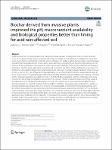Item Infomation
Full metadata record
| DC Field | Value | Language |
|---|---|---|
| dc.contributor.author | Li, Yazheng | - |
| dc.contributor.author | Abdo, Ahmed I. | - |
| dc.contributor.author | Shi, Zhaoji | - |
| dc.date.accessioned | 2023-10-03T07:12:49Z | - |
| dc.date.available | 2023-10-03T07:12:49Z | - |
| dc.date.issued | 2023 | - |
| dc.identifier.uri | https://link.springer.com/article/10.1007/s42773-023-00251-9 | - |
| dc.identifier.uri | https://dlib.phenikaa-uni.edu.vn/handle/PNK/9427 | - |
| dc.description | CC-BY | vi |
| dc.description.abstract | Rapid development in industrialization and urbanization causes serious environmental issues, of which acid rain is one of the quintessential hazards, negatively affecting soil ecology. Liming has been investigated for a long time as the most effective amendment to alter the adverse effects of soil acidity resulting from acid rain. Herein, this study tested the biochar produced from invasive plants as an alternative amendment and hypothesized that biochar can maintain better availability of macronutrients under acid rain than liming by improving soil chemical and biological properties. Therefore, a pot experiment was conducted to compare the effects of lime and biochar at two rates (1% and 3%) on soil available nitrogen (N), phosphorous (P) and potassium (K) under simulated acid rain of two pH levels (4.5: pH4.5 and 2.5: pH2.5) as compared with tap water (pH7.1) as a control treatment. | vi |
| dc.language.iso | en | vi |
| dc.publisher | Springer | vi |
| dc.subject | Biochar | vi |
| dc.subject | invasive plants | vi |
| dc.title | Biochar derived from invasive plants improved the pH, macronutrient availability and biological properties better than liming for acid rain-affected soil | vi |
| dc.type | Book | vi |
| Appears in Collections | ||
| OER - Khoa học môi trường | ||
Files in This Item:

